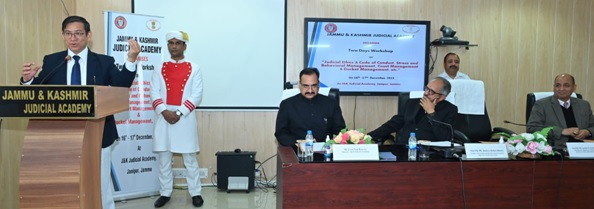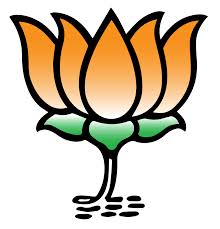Judicial Academy holds 2 day workshop on “Judicial Ethics & Code of Conduct, Stress & Behavioral Management, Court Management & Docket Management”
JAMMU, DECEMBER 16: J&K Judicial Academy, under the patronage of Justice N. Kotiswar Singh, Chief Justice, High Court of Jammu & Kashmir and Ladakh, (Patron-in-Chief, J&K Judicial Academy) and stewardship of Justice Sanjeev Kumar, Chairperson, Governing Committee for J&K Judicial Academy and guidance of Justice Javed Iqbal Wani, Justice Rahul Bharti and Justice Moksha Kazmi, members of Governing Committee for J&K Judicial Academy, organized two day workshop on “Judicial Ethics & Code of Conduct, Stress and Behavioral Management, Court Management & Docket Management, etc.” for Civil Judges (Senior and Junior Division) of Jammu Province at J&K Judicial Academy, Janipur, Jammu.

The training programme was inaugurated by the Chief Justice in presence of Justice Rahul Bharti, Member, Governing Committee for Judicial Academy, Justice (Retd.) Bansi Lal Bhat, High Court of J&K, Amit Kumar Gupta, Member Secretary, J&K Legal Services Authority and Dr. T. R. Raina, retired Professor and Head of the Blood Bank Government Medical College Jammu who also happen to be the resource persons in the two day workshop.
Chief Justice, in his inaugural address, highlighted that Judicial Officers exercise sovereign power and hold public office of great trust and responsibility and therefore, their behaviour and conduct must re-affirm the faith of public in impartiality and independence of the judiciary both inside as well as outside the court.
He said that constant efforts should be put in to bridge the gap between what they say and what they do. He shared many real-life examples and impressed upon the members of Judiciary to strike a fine balance between their personal and professional lives so that there is no overlapping of roles. His lordship emphasized that the time of a judge is public time of which he is only a trusty and therefore, he cannot afford to waste even a single minute out of it.
Chief Justice advised the judicial officers to take good care of themselves and maintain a good health as only a healthy mind and a healthy body can generate good, sound, clean and noble thoughts and suggested them to practise Yoga to control their mind. He also called upon the Judicial Officers to inculcate a habit of deriving pleasure out of reading.
Justice Rahul Bharti, in his special remarks, underlined the purpose and importance of holding such training programmes at regular intervals to motivate and enhance the awareness level of judicial officers relating to the judicial ethics and to share best practices while applying the sameto their day-to-day work.
He emphasized that when a judge sits on trial, he himself is on trial and any action which may shake the public faith in Judiciary which is the hallmark of Judicial functioning is simply not permitted. He added that a judge is judged not only by the quality of his judgments but also by the quality and purity of his character.
Y.P.Bourney, Director, J&K Judicial Academy presented the welcome address and gave an overview of the programme. He highlighted that a judicial officer must maintain the highest standards of rectitude, honesty and integrity as well as must be free from all sorts of preconceived notions, biases and prejudices. Judges are supposed and expected to live and behave like hermits who have no desire or aspiration having shed it through penance. Their mission is to supply light and not heat.He emphasized the importance of judicial officers in observing the rules of Judicial conduct and decorum in their official as well as social behavior and maintain the highest ethical standards to enhance the prestige and the dignity of their office.
On day one of workshop, the first technical session was chaired by Justice (Retd.) Bansi Lal Bhat who educated the participants about the judicial ethics. He emphasized the need to incorporate in their way of life the Judicial code of conduct for optimizing the use of working hours. He said that a judge is always under public gaze and therefore, his every action; be it professional, family or social life should be in conformity with the highest standards of probity.
In second and third technical session, Amit Gupta discussed the importance of public speaking & organization of meetings/ seminars/ awareness camps which are now indispensable part of judicial functioning. The learned resource person, through power point presentation, deliberated on the process of preparation and execution of annual legal aid calendars of activities including the identification of target groups.
All the sessions were interactive during which all the participants actively participated and shared their experiences and also discussed various aspects of the subject topics. They also raised a number of queries which were answered satisfactorily by the resource persons.






